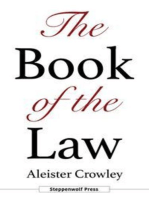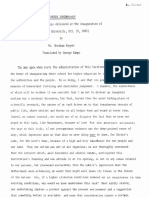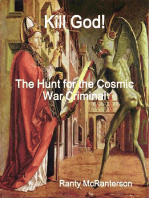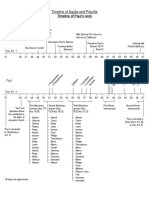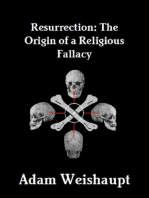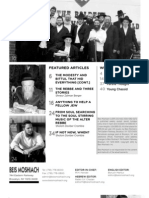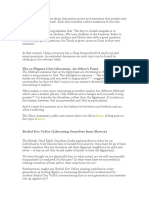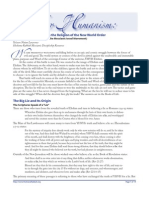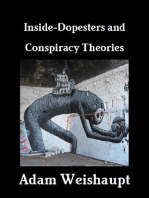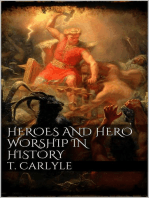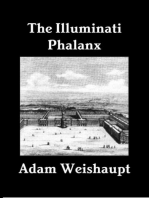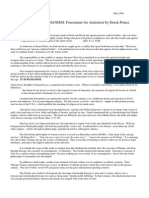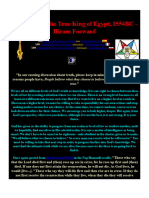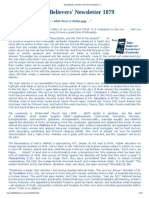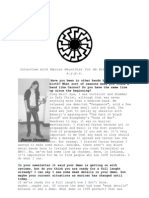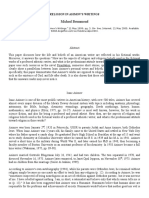By Rabbi Ilan D. Feldman: As Appeared in 12 Tishrei (Sukkos Issue) of Hamodia Prime
By Rabbi Ilan D. Feldman: As Appeared in 12 Tishrei (Sukkos Issue) of Hamodia Prime
Uploaded by
Jonathan GavantCopyright:
Available Formats
By Rabbi Ilan D. Feldman: As Appeared in 12 Tishrei (Sukkos Issue) of Hamodia Prime
By Rabbi Ilan D. Feldman: As Appeared in 12 Tishrei (Sukkos Issue) of Hamodia Prime
Uploaded by
Jonathan GavantOriginal Description:
Original Title
Copyright
Available Formats
Share this document
Did you find this document useful?
Is this content inappropriate?
Copyright:
Available Formats
By Rabbi Ilan D. Feldman: As Appeared in 12 Tishrei (Sukkos Issue) of Hamodia Prime
By Rabbi Ilan D. Feldman: As Appeared in 12 Tishrei (Sukkos Issue) of Hamodia Prime
Uploaded by
Jonathan GavantCopyright:
Available Formats
As appeared in 12 Tishrei (Sukkos Issue) of Hamodia Prime
AWE
By Rabbi Ilan D. Feldman
I write to plead the case for awe.
As the am hanivchar, we must be capable—no, skilled—at awe. An am yisrael without awe would be a nation failing its mission.
A society that has mastered technology will use technology to explain things. A scientist will resort to science to make things make
sense. And a person who knows Torah will use Torah to interpret everything, even the incomprehensible.
But then we think we understand everything. All becomes comprehensible. And then there is no awe.
Before dismissing this assertion as equating Torah with science or technology, or maintaining that Torah should not be brought to bear
to understand the world, some elaboration is in order.
*************
A well-known medrash about the four species we bundle on Succos includes a puzzling note:
Rabbi Avin said, "[There is a relevant] parable about two that went into a judge and we do not know who was victorious.
Rather we know that the one that [comes out] carrying a palm branch is the winner. So [too] Israel and the nations of the world
come and prosecute [each other] before the Holy One, blessed be He, on Rosh Hashanah and we do not know who won.
Rather when we see that Israel is coming out from in front of the Holy One, blessed be He, with their lulavim and esrogim in
their hands, we know that Israel are the winners.”(Vayikra Rabba 30:2)
What is surprising about the parable is that we are not accustomed to thinking of the judgment on Rosh Hashana as a case involving
two litigants. Rather, we think of it as an assessment of our behavior, from which we emerge either meritorious or guilty, not as winners
or losers to an antagonist. What is the intent of the medrash’s parable?
Evidently, the verdict of Rosh Hashana involves an argument between Israel and the nations of the world as to whether Yisrael should
be chosen—again. Just as creation itself is renewed from scratch, so does Yisrael’s being chosen happen annually. The nations of the
world argue against it, claiming that they are primary, that Klal Yisrael should not be, and Klal Yisrael argues to be chosen again. The
lulav, according to the medrash, is the victory wreath awarded us, indicating that we won that argument.
Indeed, throughout our history, our mortal enemies have been spiritual or genetic descendants of our avos (Yishmael, Esav, Amalek)
who, rather than mocking our status of choseness as worthless, have claimed it for themselves, and have argued that Yisrael is
rejected by Hakadosh Boruch Hu. Rivers of Jewish blood have flowed at the hands of those who prosecuted their case for choseness
against our claim.
The question then becomes: now that we carry the lulav on Succos, signifying that Hashem has chosen us as a “kingdom of kohanim
and a holy nation”, what does Hashem count on us for? What are the responsibilities that go with being chosen by HKBH? What is our
mission?
In a word, our mission is to be in awe.
*****************************
Go to the edge of the Grand Canyon alone, and you will likely see G-d, because what you see there is beyond words. If you had not
already seen pictures and become inured to it, the first time you encountered it you would almost surely exclaim, “Oh, my G-d!”,
because when we are in the presence of things we don’t understand, we start to see Hashem. Stand in that same place with a
As appeared in 12 Tishrei (Sukkos Issue) of Hamodia Prime
geologist, and you will see a big ditch caused by eons of erosion exposing layers of iron-laced limestone and sedimentary rock. He
sterilized it by explaining it with something he already knew.
“Indeed, there is Hashem in this place!” says Yaakov Avinu, “and I didn’t know it! … How awesome is this place…” Awe never comes
with knowledge. We are the people who stand in awe of Hashem because we know Him as unknowable. And this is the paradox: The
more we know we don’t understand, the more we can see Him, sense Him, and be in awe of Him. On the other hand, to have Him
figured out, to claim that, somehow, because we have and love His Torah we are the G-d experts, is to reduce Him. To claim to
understand anything about Him beyond what He tells us about Him is to avoid amazement.
Whatever we know about Hashem is so much less than what we don’t know about Him; we are in awe when we are firm about that and
we allow ourselves not to know, to be wowed! The moment we try to explain Him, we lose awe. And when we lose awe, we lose its vital
partner-- humility. We then become arrogant observers of His actions, immune to the transformative experience watching Him act can
be.
***********************
What has the world done with Covid 19? An epidemic spread across the world in a few short weeks, paralyzing world economies that
were thriving, turning bustling metropolitan areas into ghost towns, sending millions into isolation, grounding airliners, confounding
leaders who could not agree on what steps should be taken to reduce its spread, overwhelming hospitals, puzzling doctors on what
medications and methodologies to use as remedies, and, most unthinkable, closing movie theaters (and, in our world, unprecedented
shuttering of yeshivos and shuls and minyanim). What was humanity’s reaction to all this? A multi-billion dollar lunge to invent a
vaccine, lock-downs, mask wearing requirements, travel bans.
Was there wonder at a Power that could bring all this on without a bomb or a war or a cataclysmic natural event? Was there awe? Was
there humility? Unless I missed it, no one stopped long enough to admire a G-d that could pull this off so dramatically and effectively. A
humanity drunk on its own power and technological know-how resorted to whatever it already knew in reaction to the unknowable,
trying desperately to assert its control over that which would not allow itself to be controlled, and nothing changed. In our country, a
society already defined by alienation and pursuit of convenience seemed to disintegrate into anger, recrimination, riots, and an assault
on authority figures. No awe brought us together here.
If ever the world needed a clan modeling an awe-filled response to an act of G-d, it was during Covid 19. The nation delivered from
Egypt with the exclamation “Who is like You among the heavenly powers, Hashem! Who is like You, mighty in holiness, too awesome
for praise, Doer of wonders!”—that nation certainly possessed the traits called for when Hashem exposed Himself to humanity. Did we
rise to the occasion? Did the marvels of Covid lead to awe, and awe to humility, and humility to re-evaluation of our actions?
One kind of reaction, expressed early on, is uncannily misleading in this regard, and is an example of how elusive awe is. When the
overwhelming reach and impact of the pandemic began to be comprehended, some in our community strongly suggested that its
biblical proportions meant that i was coming. While rooted in a fundamental principle of emunah—Moshiach definitely is coming---and
is exciting and hopeful, such a reaction/prediction allows for no mystery or wonder. Before we try to interpret what Hashem is doing,
there exists the possibility of being awed that He is doing, because it is awesome and humbling and overwhelming and can only come
from Hashem. Amazement occurs when one confronts something too large to absorb and admires it without explaining it. For those
who were drawn to see Moshiach coming, the possibility of astonishment was trounced, replaced with an explanation. A nation skilled
in awe steers clear of explanations. Hashem is experienced most powerfully in the quiet, in the “still, small voice” that precedes
explanation and comprehension.
Another reason awe is avoided is because it calls for action on one’s part. When everything can be explained, it merely confirms what
we knew before the event, and supports complacency. Being in wonderment, observing without explaining, leaves me confronted with
something so huge it demands a change in my very being. When in awe, I tremble. When I understand, I relax.
Succos is a week devoted to celebrating hashgacha pratis, Divine Providence. Let us look at the schach and see clouds of glory,
clouds that defy understanding, clouds that, rather than cover Hashem’s presence, reveal Him in all His wonder. May Succos restore
us to the role we were chosen to model—a nation in awe of Hashem.
You might also like
- Seven Habits of A Godly LifeDocument2 pagesSeven Habits of A Godly LifeJohn Duro Alidon100% (1)
- Abraham Kuyper - Sphere Sovereignty PDFDocument28 pagesAbraham Kuyper - Sphere Sovereignty PDFMurilo Dumps SantosNo ratings yet
- Hans Jonas The Phenomenon of Life - Toward A Philosophical Biology PDFDocument320 pagesHans Jonas The Phenomenon of Life - Toward A Philosophical Biology PDFjanfal100% (2)
- The Orthodox Study Bible - Introduction and The Book of JamesDocument28 pagesThe Orthodox Study Bible - Introduction and The Book of JamesThomas Nelson Bibles82% (11)
- The Dead Sea Scrolls. Texts and Context (C. Hempel) PDFDocument568 pagesThe Dead Sea Scrolls. Texts and Context (C. Hempel) PDFspaghettipaul50% (2)
- The Satanic Aim of the United Nations, World Economic Forum & Great ResetFrom EverandThe Satanic Aim of the United Nations, World Economic Forum & Great ResetRating: 5 out of 5 stars5/5 (1)
- Kill God!: The Hunt for the Cosmic War CriminalFrom EverandKill God!: The Hunt for the Cosmic War CriminalRating: 5 out of 5 stars5/5 (2)
- David's MotherDocument8 pagesDavid's MotherKenny LeoNo ratings yet
- Aquila and Priscilla TimelineDocument1 pageAquila and Priscilla TimelinebigcheapfunNo ratings yet
- Reflection Questions: "The Way of The Humble" (Luke 18:9-14)Document2 pagesReflection Questions: "The Way of The Humble" (Luke 18:9-14)NewCityChurchCalgary100% (1)
- BLESS The LORD Richard SmallwoodDocument1 pageBLESS The LORD Richard SmallwoodFrançoise CointreNo ratings yet
- Advent Recollection "Ready To Greet The One Who Comes" A Day of Recollection and PrayerDocument2 pagesAdvent Recollection "Ready To Greet The One Who Comes" A Day of Recollection and Prayerangelinelee1100% (1)
- Toward Islamic EnglishDocument70 pagesToward Islamic EnglishkhalidrocNo ratings yet
- Candle Power: Vayeshev - Kislev, 5772 - VOLUME 112Document5 pagesCandle Power: Vayeshev - Kislev, 5772 - VOLUME 112shlomo01No ratings yet
- Beis Moshiach #825Document39 pagesBeis Moshiach #825B. MerkurNo ratings yet
- Mysticism and its Results: Being an Inquiry into the Uses and Abuses of SecrecyFrom EverandMysticism and its Results: Being an Inquiry into the Uses and Abuses of SecrecyNo ratings yet
- On Heroes Hero Worship and The Heroic in Hist 75072Document138 pagesOn Heroes Hero Worship and The Heroic in Hist 75072hoaja1987100% (1)
- Questioning Paul - Galatians - 05 - Kataginosko - Convicted and CondemnedDocument57 pagesQuestioning Paul - Galatians - 05 - Kataginosko - Convicted and CondemnedyadayahNo ratings yet
- The Wheel of Sharp WeaponsDocument15 pagesThe Wheel of Sharp WeaponsMario Galle M100% (1)
- Antichrist RisingDocument105 pagesAntichrist RisingThaddeusKozinskiNo ratings yet
- Mr. Lawrence The Mysterious Force: History AssociationDocument31 pagesMr. Lawrence The Mysterious Force: History AssociationStarwmanNo ratings yet
- Romano Guardini and The End of ModernityDocument2 pagesRomano Guardini and The End of ModernityThaddeusKozinskiNo ratings yet
- The 10 Plagues (Our Liberation, An-Other's Pain) : Here HereDocument4 pagesThe 10 Plagues (Our Liberation, An-Other's Pain) : Here HereCalev Ben-DorNo ratings yet
- Bilaam, Amalek and The OccultDocument8 pagesBilaam, Amalek and The OccultEnraiNo ratings yet
- On Heroes and Hero Worship and the Heroic in HistoryFrom EverandOn Heroes and Hero Worship and the Heroic in HistoryRating: 3.5 out of 5 stars3.5/5 (42)
- Israel and AmalekDocument5 pagesIsrael and Amaleklisa2-1No ratings yet
- On Heroes, Hero-Worship and the Heroic in History (Barnes & Noble Digital Library)From EverandOn Heroes, Hero-Worship and the Heroic in History (Barnes & Noble Digital Library)Rating: 3.5 out of 5 stars3.5/5 (42)
- Ecu A Umanism:: The Devil's Original Lie & The Religion of The New World OrderDocument14 pagesEcu A Umanism:: The Devil's Original Lie & The Religion of The New World Orderacecifer5231No ratings yet
- Kozinski ManuscriptDocument92 pagesKozinski ManuscriptThaddeusKozinskiNo ratings yet
- Fallen Angels Chapter OneDocument11 pagesFallen Angels Chapter OneAbanoubNo ratings yet
- Scripture Foundation: Genesis 3Document3 pagesScripture Foundation: Genesis 3Thomas FeeneyNo ratings yet
- A Metaphysical and Symbolical Interpretation Of: The Bible SeriesDocument51 pagesA Metaphysical and Symbolical Interpretation Of: The Bible SeriesHético MarxNo ratings yet
- Jewish Times - Volume I, No. 13... May 3, 2002Document6 pagesJewish Times - Volume I, No. 13... May 3, 2002Antonio da AlvaNo ratings yet
- God and Mr. Wells: A Critical Examination of 'God the Invisible King'From EverandGod and Mr. Wells: A Critical Examination of 'God the Invisible King'No ratings yet
- The Secret World Government: Cosmic Guidance for the LeaderFrom EverandThe Secret World Government: Cosmic Guidance for the LeaderRating: 5 out of 5 stars5/5 (1)
- The Book of Isaiah Volume IDocument220 pagesThe Book of Isaiah Volume IHumaid ShaikhNo ratings yet
- Genetic Enlightenment - The Neil Freer InterviewDocument6 pagesGenetic Enlightenment - The Neil Freer InterviewbobeczkoNo ratings yet
- OF, BY, AND FOR THE HANGED MAN: A Preeminent Philosophy for Our Complex Modern WorldFrom EverandOF, BY, AND FOR THE HANGED MAN: A Preeminent Philosophy for Our Complex Modern WorldNo ratings yet
- Yada Yah - Volume 3 Going Astray - 03 - Yada' - Knowing - My People Are Destroyed For Lack of KnowledgeDocument20 pagesYada Yah - Volume 3 Going Astray - 03 - Yada' - Knowing - My People Are Destroyed For Lack of KnowledgeyadayahNo ratings yet
- HUMANISM: Forerunner For Antichrist by Derek PrinceDocument2 pagesHUMANISM: Forerunner For Antichrist by Derek PrinceJosus MosusNo ratings yet
- Carl Jung: The Achievement of Personality: Inlibroveritas 25 Avr. 2022 5 MinDocument4 pagesCarl Jung: The Achievement of Personality: Inlibroveritas 25 Avr. 2022 5 MinlawrenceNo ratings yet
- Nkblots & Dots: by Michael C. AndradeDocument3 pagesNkblots & Dots: by Michael C. AndradeMichael C. AndradeNo ratings yet
- Hiram CompleteDocument718 pagesHiram CompleteJeru Shabazz Al-BeyNo ratings yet
- Modern IdolatryDocument1 pageModern IdolatrySantiago MogilaNo ratings yet
- Parashah 31 Emor Part 3Document12 pagesParashah 31 Emor Part 3HaSophimNo ratings yet
- Surah JumuahDocument17 pagesSurah JumuahsyeedNo ratings yet
- Two Centuries of Pentateuchal Scholarship - Joseph BlenkinsoppDocument31 pagesTwo Centuries of Pentateuchal Scholarship - Joseph BlenkinsoppGarrett JohnsonNo ratings yet
- Peace Process PDFDocument532 pagesPeace Process PDFtigeryyNo ratings yet
- Jews and Anti-Semitism in Scandinavia (Knut Eriksen, 2011) - ÖzetDocument14 pagesJews and Anti-Semitism in Scandinavia (Knut Eriksen, 2011) - Özetayazan2006No ratings yet
- TestemunhoDocument3 pagesTestemunhoErik AraujoNo ratings yet
- August 13 Shabbat AnnouncementsDocument4 pagesAugust 13 Shabbat AnnouncementsgnswebNo ratings yet
- "On The Miracles of Satan" by William TyndaleDocument7 pages"On The Miracles of Satan" by William TyndaleKunedog1No ratings yet
- Carl Schmitt, The Inquisition, and Totalitarianism - Arthur VersluisDocument14 pagesCarl Schmitt, The Inquisition, and Totalitarianism - Arthur VersluisAnonymous eDvzmv100% (1)
- 1079 - Esau - Edom, and The Trail of The Serpent - IDocument12 pages1079 - Esau - Edom, and The Trail of The Serpent - IAgada Peter100% (1)
- The Jews of Goa: ProofDocument51 pagesThe Jews of Goa: ProofAbhilash MalayilNo ratings yet
- 3RD-QTR-CL-P L2 - GOD IS ALMIGHTY (Gideon Defeats The Midianites)Document10 pages3RD-QTR-CL-P L2 - GOD IS ALMIGHTY (Gideon Defeats The Midianites)Jane SantelicesNo ratings yet
- Marcus Neuntoter (CARNUN) Interview 1996Document3 pagesMarcus Neuntoter (CARNUN) Interview 1996John O'BrienNo ratings yet
- PrivilegeDocument5 pagesPrivilegeJohn Anjo ZabalaNo ratings yet
- Bremmond-Religion in Asimov's WritingDocument5 pagesBremmond-Religion in Asimov's WritingJaime Reyes CalderónNo ratings yet
- Walking The Red Line: Israelis in Search of Justice For PalestineDocument10 pagesWalking The Red Line: Israelis in Search of Justice For PalestineMeir AmorNo ratings yet
- C. Miguel Lopez de Legazpi: Arthur Macarthur, JRDocument4 pagesC. Miguel Lopez de Legazpi: Arthur Macarthur, JRLian GarlNo ratings yet
- Letter of Paul To The RomansDocument31 pagesLetter of Paul To The RomansAeb Asib GbhertNo ratings yet
- Thinking PausitivityDocument15 pagesThinking PausitivityDr Mohan MuthalNo ratings yet

